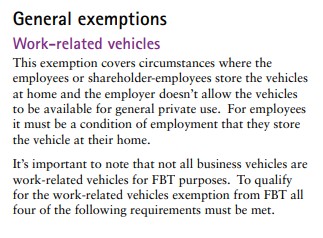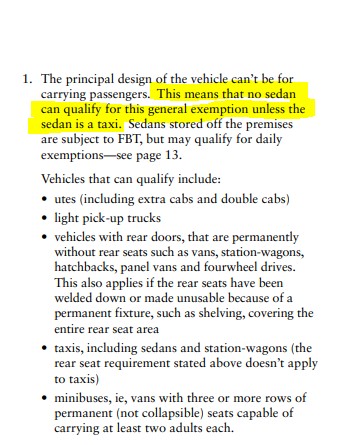|
|
|
I'm pretty sure the FBT rules changed a while back so that small companies could have up to two cars exempt for FBT purposes in certain circumstances, regardless of the 'work exemption' rules - it just changed what you could actually claim (e.g. the business portion of running costs, not 100% like you would if you were returning FBT). IDK if that's still the case though.
So most people running Utes under the mistaken belief that they are exempt from FBT anyway are probably covered by that, but on the balance of probability they're likely over-claiming their running costs.
I still think EVs should be zero-rated for FBT purposes up to a certain value to drive fleet uptake and ultimately mop up new car demand for EVs and also stimulate the used car market when they come up for renewal, but I've got no evidence as to whether that's likely to be effective or not.
One of our EVs is owned by our company. We kept a log book for the first 3 months we owned it and based on that the private use percentage was ascertained. This percentage is applied in terms of its running costs, GST refund and travel expense claims for tax reconciliation purposes. As we live rurally our PO box and courier drop off requirements make a significant portion of our travel, plus the occasional delivery run as EV running costs are far cheaper than courier rates for delivery of large orders in some cases.
Our Evnex charger records the charging attributable to the car so 'fueling' cost can accurately be claimed.
We were advised to go the log book route by our accountant as the FBT method is vehicle value based and retains original purchase price for some years. Been there done that and wised up.
The alternative method of recording all business related travel, and then claiming them at IRD km rates, is too tedious to be viable. 3 months of log book was enough and I'm not looking forward to doing it again in a couple of years time as is required by IRD.
https://www.harmlesssolutions.co.nz/
tripper1000:
Right so "factually" wrong if you semantically read between my lines, but factually correct once you get into the details. A "car" is not defined as a "work vehicle", and is therefore presently unable to quality for FBT exemptions. My point still stands, if EV's were allowed to qualify as "work vehicles"/wouldn't cost the govt or business/would improve the choices in the used vehicle market for private buyers/ etc etc.
Cars certainly can be claimed as work vehicles, Just have to be in a line of work where a sedan is required and its all good.
And it's over. The Clean Car Discount that is, for cars registered before 2024. Rebates must be applied for after registration and before
Blue Sky: shadowfoot.bsky.social
Shadowfoot:
And it's over. The Clean Car Discount that is, for cars registered before 2024. Rebates must be applied for after registration and before
"Rebate applications submitted after 11:59pm on 31 December 2023 won’t be accepted. There will be no exceptions."
I'm guessing there could be a spike in dealers registering their floor stock as "demonstrator models"...
If they can afford to hold them for 3 months they are then free to on-sell them, otherwise they cannot claim the discount...
wellygary:
"Rebate applications submitted after 11:59pm on 31 December 2023 won’t be accepted. There will be no exceptions."
I'm guessing there could be a spike in dealers registering their floor stock as "demonstrator models"...
If they can afford to hold them for 3 months they are then free to on-sell them, otherwise they cannot claim the discount...
Is quite the point of discussion for us right now....
One place where battery swapping works at least for scooters.
Taiwan network doing 400,000 battery swaps daily !
Taiwan’s Gogoro launches e-scooters, battery swapping in Philippines
Gogoro looking to expand international footprint with Manila commercial launch
https://www.taiwannews.com.tw/en/news/5052354
""
The Gogoro Network currently has around 600,000 riders and more than 1.3 million smart batteries in circulation at more than 2,500 locations around Taiwan.
With more than 400,000 daily battery swaps and more than 500 million total battery swaps to date, Gogoro has saved over 770,000 tons of carbon dioxide since its launch.
""

kingdragonfly:
And frankly it's bright-red baboon butt ugly.
mate come on baboons can't help how their butts look
iPad Pro 11" + iPhone 15 Pro Max + 2degrees 4tw!
These comments are my own and do not represent the opinions of 2degrees.
richms:
Cars certainly can be claimed as work vehicles, Just have to be in a line of work where a sedan is required and its all good.
Any vehicle can be be a work vehicle. For the likes of sole traders. If it is partially used for work and partially for private, a logbook can be keep for a few months, which sets the proportionality for the next few years. This is the stuff above posters are talking about, regarding logging their trips from their home office to their PO box in town as a work trip. Also possible for people with a home office to start their work day in their home office, then drive to their main office, before returning home to work a little more in their home office. In this case all the travel is between places of work, so is considered business travel. (where as commuting from home to work if they didn't do any work in their home office first would be considered private travel).
If the vehicle is company owned, Other than the exceptions, FBT needs to be paid if somebody takes the car home at night (and it can be paid for one day only). - at my old work we did this if somebody needed to take a car home to make an eairly start for a trip to site the next day.
Double cab utes, small open deck trucks (and taxi's) are the only 5 seat vehicle exempt from FBT for taking the car home at night (providing a bunch of critrea are met). And a common arrangement is for FBT to be paid for the weekends only. This dates back to an era when double cab utes were not popular cars for the likes of accountants.
The law creates a perverse incentive for busniesses to buy utes. Quick fix is to change it to only single cab utes.


I'm not an accountant, get professional advice on this stuff.
Scott3:
If the vehicle is company owned, Other than the exceptions, FBT needs to be paid if somebody takes the car home at night (and it can be paid for one day only). - at my old work we did this if somebody needed to take a car home to make an eairly start for a trip to site the next day.
There are carve outs for small companies and vehicles driven by shareholder employees, so a vehicle being owned by a company isn't decisive on its own - and this applies regardless of vehicle type, from what I can recall.
Scott3:
richms:
Cars certainly can be claimed as work vehicles, Just have to be in a line of work where a sedan is required and its all good.
There are two distinct different things here.
The law creates a perverse incentive for busniesses to buy utes. Quick fix is to change it to only single cab utes.
I'm not an accountant, get professional advice on this stuff.
Sales reps are generally required to drive a sedan with internal access to the boot disabled to be able to securely store the sample range.
I will have to check what other criteria are needed but AFAIK its all fine if you can demonstrate a requirement for a certain type of vehicle, and the need to have it not having writing on it basically saying "BREAK IN VALUABLES INSIDE"
The thing is this is a legitimate need for it, whereas most of the dual cab utes being driven around are just taking the piss with being a work vehicle so IMO this whole loophole should be got rid of.
Work vehicle should be stored at work when not in use, and if its used to travel to and from work by a salaried employee should be taxed. No reason that someone with a work car should get a free ride (literally) when everyone else has to pay to get their own way there.
ARS Technica: For MY2022, the EPA says that the average real-world CO2 emissions for all new vehicles fell by 10 g/mile to 337 g/mile, the lowest average it has ever measured. Similarly, real-world fuel economy increased by 0.6 mpg for MY2022, to 26 mpg—this, too, is a record high and the single-largest year-on-year improvement for both CO2 and mpg for nine years.
And it's not a one-off. Despite the occasional off year, the EPA's data shows that since 2004, US passenger fleet emissions have decreased by 27 percent, or 123 g/mile. And over the same time, average fuel economy has increased by 35 percent, or 6.7 mpg. Even better, the EPA says its preliminary data shows even greater declines in carbon emissions and greater increases in fuel efficiency for MY2023.
Caught this doco on Al Jazeera recently. Some interesting insights into the US/China/Euro rivalry in EV supply. The comment from the Chinese spokesman regarding China's political stability and focus vs. western countries that have a governmental change every few years was a real light bulb moment for me.
https://www.aljazeera.com/program/counting-the-cost/2023/12/23/who-wins-the-race-for-electric-cars
https://www.harmlesssolutions.co.nz/
|
|
|
